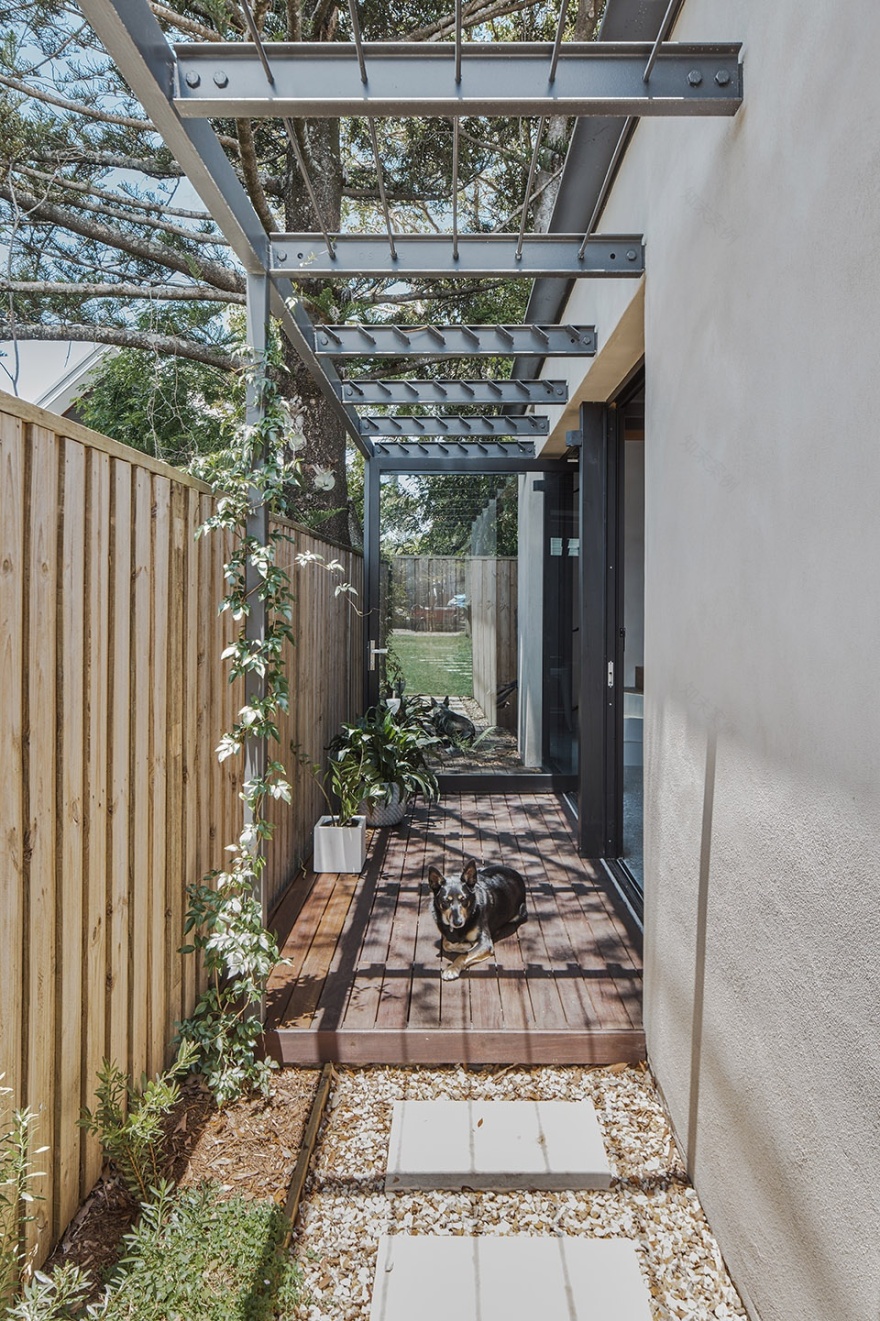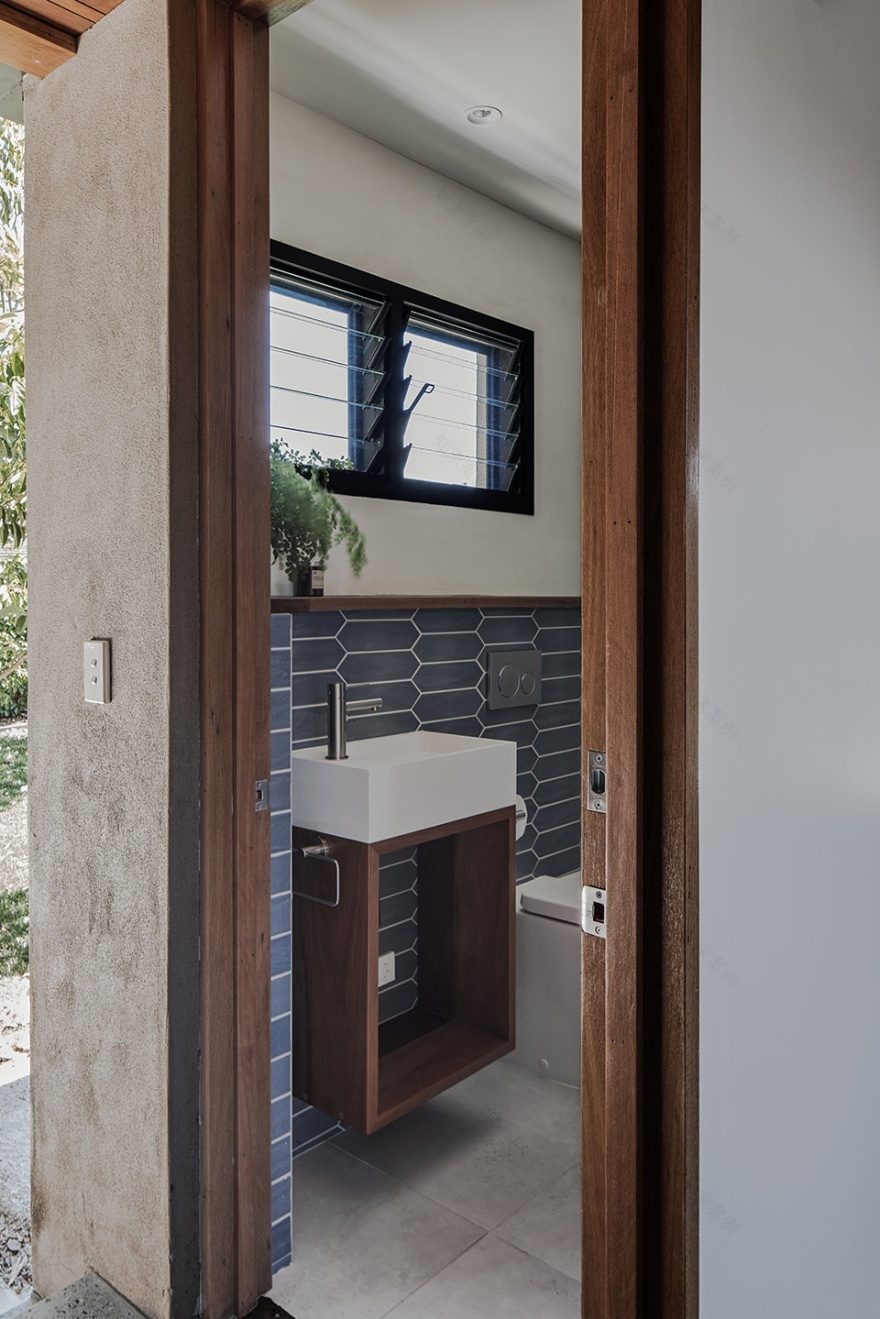查看完整案例


收藏

下载
几年前,由于想逃离城市生活,同时更好地享受家的氛围,Joel Turner和Danni Turner从悉尼搬到了Suffolk公园附近。他们在海滨社区内买下了一座典型的纤维制小屋,并收养了一只名叫Franky的搜救犬,开始了属于他们自己的家庭生活。然而,虽然纤维制的小屋很迷人,但它仍然存在一些不可避免的缺陷,比如,在夏天的时候,小屋里会非常炎热,而在雨季时,小屋里又会变得非常潮湿,甚至会发霉,住宅又是向西的朝向,同时,对于一个正在逐渐步入生活正轨的家庭来说,这座小屋的面积也有点过于狭小了。
Joel and Danni Turner moved from Sydney to Suffolk Park a few years ago to escape the city and be closer to family. They bought a quintessential fibro shack in the beachside community, adopted a rescue dog Franky, and started a family of their own. The fibro shack, whilst having some charm, was falling apart, it was hot in summer, damp and mouldy during the wetter months, slightly too small for a growing family, and oriented to the west.
▼住宅外观,exterior view of the studio
随后,这对夫妻邀请了Danni的姐姐Nikki Mote来重新设计这座住宅,并在现有住宅的后方创造一个全新的附属住宅空间。本项目的设计任务是设计一个灵活的附属生活空间,同时随着时间的推移,它也要具备不断满足和适应家庭生活的各种需求的能力。从短期看,在主要住宅空间仍在施工的情况下,这个附属空间应该能够为Joel、Danni和他们的第一个孩子Sonny提供足够的生活空间。而当主要空间完工后,这个附属部分则可以为该家庭和来访的客人提供额外的住宿空间。因此,这个附属住宅空间需要具备以下功能:在住宅的主要部分仍在施工的情况下,可以为Joel提供一个工作空间,而在将来,则可以为理疗师Danni提供一个可作为家庭理疗室的空间。最后,为了日后的住宅转售,住户还希望这个空间在必要时可以充当车库使用。
They engaged Danni’s sister, Nikki Mote, to redesign the house, and a new studio at the rear of the property. The studio brief was to design a flexible space that could adapt over time with the family’s needs. In the short term it needed to house Joel, Danni, Sonny (their first child) while the main house was under construction. After which the studio would act as additional accommodation for family and guests. The studio needed to incorporate a workshop which could be used by Joel for construction of the main house, and in future a potential home treatment space for Danni who is a local physiotherapist. Finally, for resale value they thought it was important that the studio have the option to act as a garage.
▼住宅外观局部,下层采用Hempcrete作为外立面材料,partial exterior view with the Hempcrete as the lower story building skin
最终,Joel选择了Hempcrete这种生物符合材料(即麻类植物碎片和石灰的混合物)作为附属住宅下层空间的外表皮,从而充分发挥其低能耗、高热阻以及强湿度调节能力的特性;实际上,对于这个位于北部河流流域中的项目来说,这也是一种非常理想的组合型材料,因为它可以帮助整个居住空间适应这里典型的潮湿的夏日环境。上层空间略微后退,在外立面材料上选择了竖向的再生木材覆层。在附属住宅的内部,空间布局紧凑且高效,设置一系列可滑动的隔板和一个位于夹层的卧室空间,这种设计不仅可以使空间有多种组合方式,同时还保证了该附属住宅空间的占地面积保持在一个范围之内,从而不会对后院造成太大的影响。
该附属住宅的入口采用一扇大型的转轴门,当门处于打开的情况下,整个居住空间都朝向北侧的庭院开放。转轴门上设有带有固定百叶的横向小窗,百叶能够确保冬季的阳光能够最大限度地照进室内,同时将夏季的阳光最大限度地阻隔在室外。附属住宅采用抛光混凝土地板,以增加建筑体量的热质量。服务空间则沿着附属住宅的西南立面布置,包括一个工作台、一间卫生间和一个可以直接通向周边环境的自行车存放处。
▼住宅外观局部,服务空间沿着西南立面布置,partial exterior view, the service spine runs along the south-western façade
Hempcrete was chosen for the lower story building skin, due to it’s low-embodied energy, high R-value, and its moisture regulation properties; an ideal mix to combat the humid summers typical of the Northern Rivers. Vertical recycled timber cladding was selected for the set-back upper floor. A compact efficient layout, internal sliding partitions and a mezzanine bedroom has allowed for various configurations whilst keeping a small footprint and not impinging too much on the backyard.
Large pivot and sliding doors open the living space to a north-facing courtyard. The doors are shaded by a pergola with fixed louvres angled to maximise sun in winter and block out the summer sun. The floors are polished concrete for additional thermal mass. A service spine runs along the south-western façade accommodating the workbench, bathroom and an externally-accessed bike storage.
▼住宅外观局部,上层空间采用横向的百叶窗、单坡屋顶和竖向的再生木材覆层,partial exterior view horizontal louvers, the mono-pitched roof and the vertical recycled timber cladding
夹层空间与下面的起居空间之间有一个空隙,以增加室内的空气流通和自然采光。同时,辅以可手动调节的天窗和玻璃百叶窗,这个空隙还有助于室内空间的对流通风和热压通风。双层通高的起居空间不仅有助于附属住宅保持极小的占地面积,更创造了一个明亮舒适的生活空间。设计师对细节和工艺的关注,以及对被动式通风采光设计的考量和对材料的选择,使得本项目成为了一个空间灵活、美丽舒适的小住宅空间。
The mezzanine incorporates a void over the living space below to increase airflow and light penetration. Operable skylights and glazed louvres allow for cross and stack ventilation through the void. The double-height space to the living area provides a light-filled dramatic volume for such a small footprint. The attention to detail and the craftsmanship, as well as the passive design considerations and material choice make it a beautiful comfortable flexible tiny house.
▼室内起居空间,带有一个室外侧廊,the living space with an outdoor side corridor
▼起居室空间局部,使用可折叠餐桌,partial interior view of the living space with the folding dining table
▼室外侧廊,the outdoor side corridor
▼室内空间局部,二层通高的空隙空间上方设有可调节天窗,有助于改善室内通风环境,partial interior view, the operable skylight allows for cross and stack ventilation through the void
本项目使得住宅住户Joel第一次得以机会来自己建造自己的一个空间,不仅可以测试和磨炼他的建筑技能,更能让他尽情地探索各种建筑材料和它们的热性能,获得一些经验,从而更好地更新改造主要住宅空间。值得一提的是,作为一名环境保护方面的科学家,Joel对于可持续性有着相当高的热情,同时,他也希望能够在这个附属住宅空间内尽可能地采用一些被动式的能源设计。
Construction of the studio would allow Joel, first-time owner builder, to test and hone his building skills and explore materials and their thermal performance as a test-case for renovating the main house. Joel, who is a conservation scientist, is passionate about sustainability, and wanted a house that would push the boundaries of passive design.
▼从夹层看首层的起居空间,二层通高的空隙空间可以增加室内的空气流通和自然采光,viewing the living space from the mezzanine, the double-height void space increases airflow and light penetration
▼夹层卧室空间局部,使用胶合板天花板,partial view of the mezzanine bedroom with the plywood ceilings
▼夹层卧室的窗边空间,可供住户在此休息放松,the window-side space at the mezzanine space where residents can relaxed themselves
在本项目中,其他的特色性环保设计还包括:使用胶合板天花板、黏土和石灰抹面、零挥发性有机化合涂料,以及在木制饰面板上使用Livos油漆涂料等,同时,车库拆除后的回收木料也得到了充分的利用,被用于制作门框和架子,此外,环保设计还表现在一个大型的水箱、室外冷风通风口、风扇以及整个附属住宅空间中都使用的LED灯等。
Other eco-friendly design features include the use of plywood for ceiling panelling, clay and lime renders, zero VOC paints, Livos oils to timber finishes, onsite recycling of timber from the demolished garage for door frames and shelving, a large water tank, fridge external venting, fans, and LEDs throughout.
▼卫生间局部,采用横向的百叶窗和木质门框,partial view of the bathroom view the horizontal louvers and timber door frames
Completion date: 2018
Building levels: 1
客服
消息
收藏
下载
最近


















